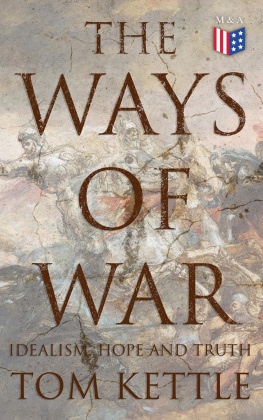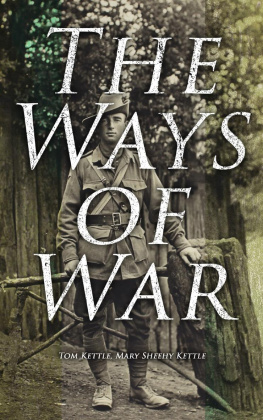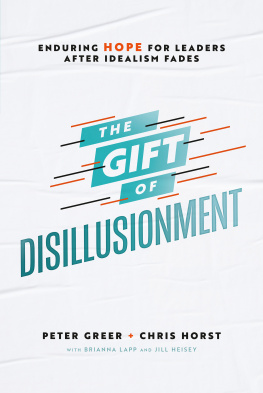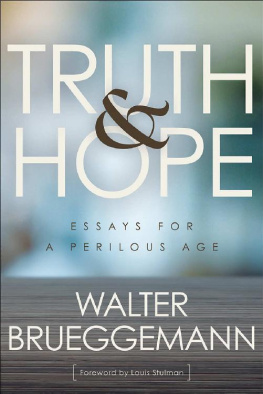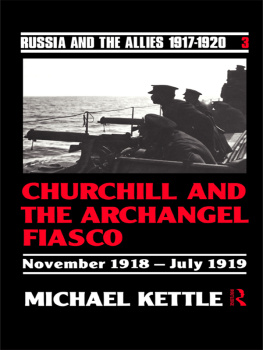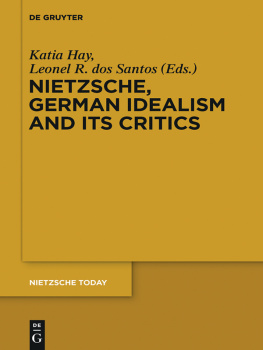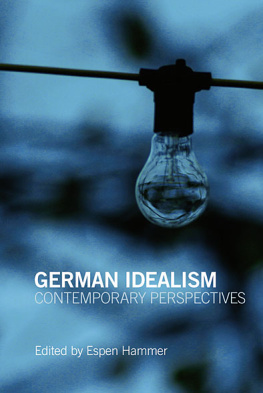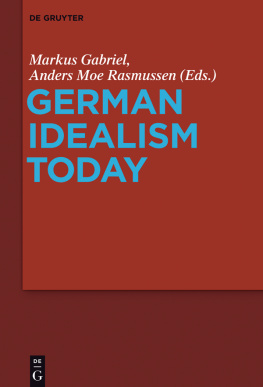PREFATORY NOTE
Perhaps the order of the chapters in the present book requires a word of explanation. They have a natural sequence as the confessions of an Irish man of letters as to why he felt called upon to offer up his life in the war for the freedom of the world. Kettle was one of the most brilliant figures both in the Young Ireland and Young Europe of his time. The opening chapters reveal him as a Nationalist concerned about the liberty not only of Irelandthough he never for a moment forgot thatbut of every nation, small and great. He hoped to make these chapters part of a separate book, expounding the Irish attitude to the war; but unfortunately, as one must think, the War Office would not permit an Irish Officer to put his name to a work of the kind. After the chapters describing the inevitable sympathy of an Irishman with Serbia and Belgiumlittle nations attacked by two Imperial bulliescomes an account of the tragic scenes Kettle himself witnessed in Belgium, where he served as a war-correspondent in the early days of the war. Silhouettes from the Front, which follow, describe what he saw and felt later on, when, having taken a commission in the Dublin Fusiliers, he accompanied his regiment to France in time to take part in the Battle of the Somme. Then some chapters containing hints of that passion for France which was one of the great passions of his life. One of these, entitled The New France, was written before the war had made the world realise that France is still the triumphant flag-bearer of European civilisation. Then, in The Gospel of the Devil, we have an examination of the armed philosophies that have laid so much of France and the rest of Europe desolate. The book closes with Trade or Honour?an appeal to the Allies to preserve high and disinterested motives in ending the war as in beginning it, and to turn a deaf ear to those political hucksters to whom gain means more than freedom. Thus The Ways of War is a book, not only of patriotism, but of international idealism. Above all, it is a passionate human documentthe apologia pro vita sua of a soldier who died for freedom.
L.
Many of the chapters in this book have already appeared in various newspapers and magazines, to the editors and proprietors of which thanks are due for permission to reprint them here. The sources of the chapters referred to are as follows
| Under the Heel of the Hun | } | Daily News. |
| Zur Erinnerung |
| The Way to the Trenches |
| G.H.Q. |
| Belgium in Time of Peace: Freemans Journal. |
| The New France: Irish Ecclesiastical Record. |
| The Soldier-Priests of France: The Hibernian Journal. |
| The Gospel of the Devil: T. P.s War Journal. |
MEMOIR
My husband in his last letter to his brother, written on the 8th of September, 1916, on the battlefield, expressed the wish that I should write a memoir of him as a preface to his war book. It is only at his express instance that I would have undertaken the writing of such a memoir, as there are many obvious reasonsnotably twowhy I am unfitted for that high duty. I have not the literary gifts of many of his distinguished friends, who in writing of him would have exercised their powers of sympathetic understanding and appreciation to the uttermost. But the personal relationship is an even greater handicap. If the reader will accept me as his comradesince he has honoured me with the proud distinctionI shall do my best to interpret the soul-side with which he faced the world. For my shortcomings, I must crave indulgence. I only bring to this task the vision of love.
I shall give hereafter a biographical sketch, but first I wish to deal with his attitude to the war and a few points which he desired to be emphasised.
What urged himthe scholar, the metaphysician, the poet, above all the Irishman, irrevocably and immutably Irish, the man of peace, who had nothing of the soldier except courageto take a commission in the British Army and engage in the cruel and bloody business of war? His motives for taking this step, he wished to be made clear beyond misrepresentation. It should be unnecessary to do this, as he proclaimed them on many platforms and in many papers. His attitude and action are the natural sequence and logic of his character and ideals. Since I first knew him, he loved to call himself a capitaine routier of freedom, and that is the alpha and omega of his whole personality. As Mr. Lynd has said, he was not a Nationalist through love of a flag, but through love of freedom. It was this love of freedom that made him in his student days in the Royal University lead the protest against the playing of God Save the King at the conferring of Degrees. The words of the Students manifesto went, We desire to protest against the unjust, wasteful and inefficient Government of which that air is a symbol. It was the same love of freedom that made him during the Boer War distribute in the streets of Dublin anti-recruiting leaflets. The Tom Kettle who did these things, who said in an election speech in 1910 that for his part he preferred German Invasion to British Finance, was the same Tom Kettle who believed it Irelands duty in 1914 to take the sword against Germany as the Ally of England.
This war is without parallel, he wrote in August, 1914; Britain, France, Russia, enter it, purged from their past sins of domination. France is right now as she was wrong in 1870, England is right now as she was wrong in the Boer War, Russia is right now as she was wrong on Bloody Sunday.
In August and September, he acted as war correspondent for the Daily News, and in this capacity was a witness of the agony of Belgium. He returned to Ireland burning with indignation against Prussia. He referred to Germany as the outlaw of Europe. It is impossible not to be with Belgium in this struggle, he wrote to the Daily News; it is impossible any longer to be passive. Germany has thrown down a well-considered challenge to all the forces of our civilisation. War is hell, but it is only a hell of suffering, not of dishonour, and through it, over its flaming coals, Justice must walk, were it on bare feet.
It was as an Irish soldier in the army of Europe and civilisation that he entered the war. He was horrified, said Mr. Lynd very truly, by the spectacle of a bully let loose on a little nation. He was horrified, too, at the philosophic lie at the back of all this greed of territory and power. He was horrified at seeing the Europe he loved going down into brawling and bloody ruin. Not leastand no one can understand contemporary Ireland who does not realise thishe was horrified by the thought that if Germany won, Belgium would be what he had mourned in Irelanda nation in chains. An international Nationalistthat was the mood in which he offered his services to the War Office.
I think the chief reason his motives have been misunderstood is that few have gone to the trouble of understanding his wide outlook. He was a European. He was deeply steeped in European culture. He was au courant with European politics. He knew his France, his Germany, his Russia as well as we know our Limerick, Cork and Belfast. Mr. Healy once said his idea of a nation ended with the Kish lightship. Tom Kettles ideal was an Ireland identified with the life of Europe. Ireland, he wrote, awaits her Goethe who will one day arise to teach her that, while a strong nation has herself for centre, she has the universe for circumference.... My only programme for Ireland consists in equal parts of Home Rule and the Ten Commandments. My only counsel to Ireland is, that to become deeply Irish, she must become European.

